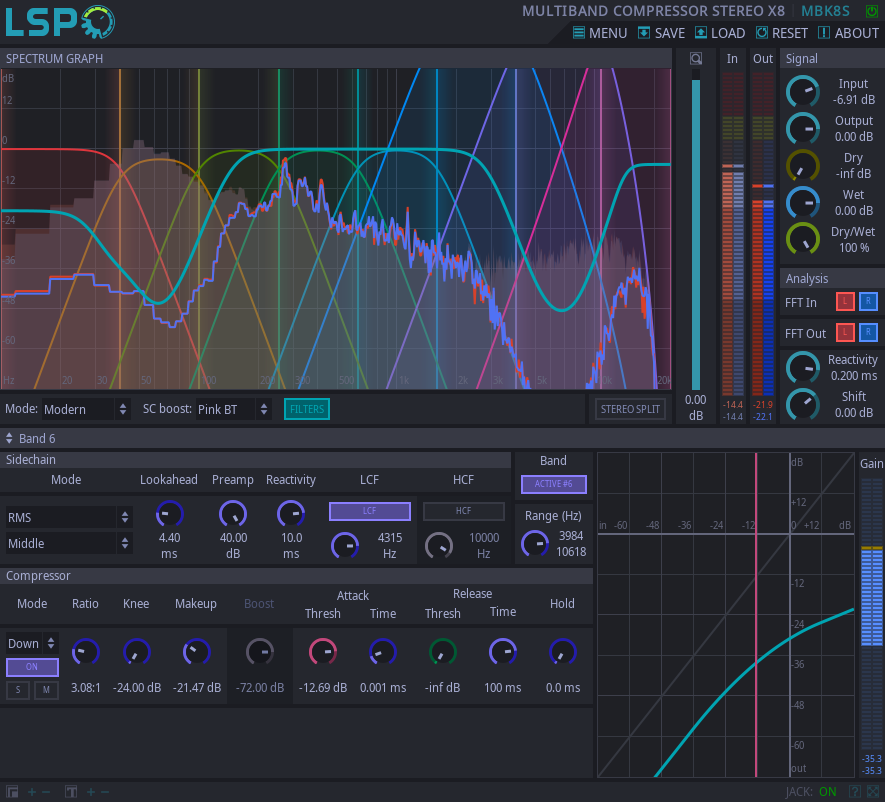Multiband Compressor Stereo x8

Detailed: LSP Multiband Compressor Stereo x8 (MBK8S)
Formats: CLAP, JACK, LADSPA, LV2, VST2, VST3
Categories: Compressor
Developer: Vladimir Sadovnikov
Description:
This plugin performs multiband compression of stereo input signal. Flexible sidechain-control configuration isprovided.
As opposite to most available multiband compressors, this compressor provides numerous special functions listed below:
- Modern operating mode - special operating mode that allows to look different at classic crossover-based compressors. Crossover-based compressors use crossover filters for splitting the original signal into independent frequency bands, then process each band independently by it's individual compressor. Finally, all bands become phase-compensated using all-pass filers and then summarized, so the output signal is formed. In Modern mode, each band is processed by pair of dynamic shelving filters. This allows the better control the gain of each band.
- Linear Phase mode allows to split audio signal into multiple frequency bands with linear phase shift. This introduces additional latency but gives several benefits:
- Unlike classic crossovers which use IIR (Infinite Impulse Response) filters to split signal into multiple bands and shift the phase of the audio signal at band split points, the Linear Phase allows to use FIR (Finite Impulse Response) filters which are deprived of this.
- Unlike most IIR filters which are designed using bilinear transform, linear phase filters allow to simulate their transfer function to look like the transfer function of analog filters, without deforming it's magnitude envelope near the nyquist frequency.
- Unlike design of classic Linkwitz-Riley filters, the design of IIR filters provides shorter transition zone of the filter.
- Sidechain boost - special mode for assigning the same weight for higher frequencies opposite to lower frequencies. In usual case, the frequency band is processed by compressor 'as is'. By the other side, the usual audio signal has 3 db/octave falloff in the frequency domain and could be compared with the pink noise. So the lower frequencies take more effect on compressor rather than higher frequencies. Sidechain boost feature allows to compensate the -3 dB/octave falloff of the signal spectrum and, even more, make the signal spectrum growing +3 dB/octave in the almost fully audible frequency range. This is done by specially designed +3 db/oct and +6 db/oct shelving filters.
- Lookahead option - each band of compressor can work with some prediction, the lookahead time can be set for each channel independently. To avoid phase distortions, all other bands automatically become delayed for a individually calculated period of time. The overall delay time of the input signal is reported to the host by the plugin as a latency.
- Up to 8 bands are available for use, each band is not attached to it's strict frequency range and can control any frequency range. Also, each band can be controlled by completely different frequency range that can be obtained by applying low-pass and hi-pass filters to the sidechain signal.
- Stereo split mode allows to apply compression to the left and right channels independently.
The compressor can provide two release times. If the compressor's envelope indicated by the dot on the compression curve is above the ‘Release Thresh’ then the ‘Release Time’ parameter is taken as a release time for processing. Otherwise, if the envelope is below the ‘Release Thresh’ then the ‘Attack Time’ parameter is taken as a release time for processing.
Controls:
- Bypass - bypass switch, when turned on (led indicator is shining), the plugin bypasses signal.
- Mode - combo box that allows to switch between the following modes:
- Classic - classic operating mode using IIR filters and allpass filters to compensate phase shifts.
- Modern - modern operating mode using IIR shelving filters to adjust the gain of each frequency band.
- Linear Phase - linear phase operating mode using FFT transform (FIR filters) to split signal into multiple bands, introduces additional latency.
- SC Boost - enables addidional boost of the sidechain signal:
- None - no sidechain boost is applied.
- Pink BT - a +3db/octave sidechain boost using bilinear-transformed shelving filter.
- Pink MT - a +3db/octave sidechain boost using matched-transformed shelving filter.
- Brown BT - a +6db/octave sidechain boost using bilinear-transformed shelving filter.
- Brown MT - a +6db/octave sidechain boost using matched-transformed shelving filter.
- Link - the name of shared memory link used to receive sidechain signal
- FFT L, R In - enables FFT curve graph of input signal on the spectrum graph.
- FFT L, R Out - enables FFT curve graph of output signal on the spectrum graph.
- Stereo Split - enables independent processing of left and right channels.
- Pre-mix - shows pre-mix control overlay.
- Filters L, R - enables drawing transfer function of each sidechain filter on the spectrum graph.
- Zoom - zoom fader, allows to adjust zoom on the frequency chart.
'Signal' section:
- Input - the amount of gain applied to the input signal before processing.
- Output - the amount of gain applied to the output signal before processing.
- Dry - the amount of dry (unprocessed) signal passed to the output.
- Wet - the amount of wet (processed) signal passed to the output.
- Dry/Wet - the knob that controls the balance between the mixed dry and wet signal (see Dry and Wet) and the dry (unprocessed) signal.
- In - the input signal meter.
- Out - the output signal meter.
'Analysis' section:
- Reactivity - the reactivity (smoothness) of the spectral analysis.
- Shift - allows to adjust the overall gain of the analysis.
'Split' section - allows to quickly control all bands and provides most frequently used controls:
- Band - allows to enable the corresponding band, band #0 is always enabled.
- Hue - allows to control the hue of the color assigned to the band.
- Range - allows to adjust the start frequency of the frequency range controlled by the band.
- Controls - set of buttons that control the behaviour of the compressor:
- On - enables compressor assigned to the corresponding frequency band.
- S - turns on soloing mode to the selected band by applying -36 dB gain to non-soloing bands
- M - turns on muting mode to the selected band by applying -36 dB gain to it
- Sidechain combo - allows to select external sidechain inputs or shared memory audio stream
- SC Preamp - applies additional gain to the sidechain band.
- Makeup - applies additional gain to the output of the corresponding compressor.
- Ratio - the compression ratio for the corresponding band.
- Knee - the compression knee for the corresponding band.
- Attack Level - threshold of the compressor, placed in the middle of the knee.
- Attack Time - attack time of the compressor.
- Release Level - relative to the Attack Level threshold that sets up the threshold of Release Time.
- Release Time - release time of the compressor.
'Band N' section - allows to control all parameters for the selected frequency band:
- Sidechain Source - allows to set the sidechain source
- Internal - the audio inputs of plugin are used as sidechain signal.
- Link - the shared memory link is used to receive sidechain signal.
- Sidechain Mode - combo box that allows to control sidechain working mode:
- Peak - peak mode.
- RMS - Root Mean Square (SMA) of the input signal.
- LPF - input signal processed by recursive 1-pole Low-Pass Filter (LPF).
- SMA - input signal processed by Simple Moving Average (SMA) filter.
- Middle - middle part of signal is used for sidechain processing.
- Side - side part of signal is used for sidechain processing.
- Left - only left channel is used for sidechain processing.
- Right - only right channel is used for sidechain processing.
- Min - the absolute minimum value is taken from stereo input.
- Max - the absolute maximum value is taken from stereo input.
- Left/Right - left and right channels are being compressed using respectively the left and right sidechain channels in stereo split mode.
- Right/Left - left and right channels are being compressed using respectively the right and left sidechain channels in stereo split mode.
- Mid/Side - left and right channels are being compressed using respectively the middle and side parts of sidechain signal in stereo split mode.
- Side/Mid - left and right channels are being compressed using respectively the side and middle parts of sidechain signal in stereo split mode.
- Sidechain Lookahead - look-ahead time of the sidechain relative to the input signal.
- Sidechain Preamp - pre-amplification of the sidechain signal.
- Sidechain Reactivity - reactivity of the sidechain signal.
- Sidechain LCF - button turns on the low-cut filter for the sidechain signal and knob allows to control the frequency of the filter.
- Sidechain HCF - button turns on the high-cut filter for the sidechain signal and knob allows to control the frequency of the filter.
- Compressor Solo - turns on soloing mode to the selected band by applying -36 dB gain to non-soloing bands
- Compressor Mute - turns on muting mode to the selected band by applying -36 dB gain to it
- Compressor Mode - compression mode:
- Downward (Down) - the downward compressor.
- Upward (Up) - the upward compressor.
- Boosting (Boost) - the boosting compressor (upward with precise boost control).
- Compressor On - enables compressor assigned to the corresponding frequency band.
- Compressor Ratio - compression ratio.
- Compressor Knee - size of compression knee.
- Compressor Makeup - additional amplification gain after compression stage.
- Compressor Boost - this knob is related to upward and boosting compression modes only. For upward mode it defines the threshold below which the constant amplification will be applied to the input signal. This prevents compressor from applying infinite amplification to very quiet signals. For boosting mode it defines the overall boost of the signal. The boost threshold is computed automatically.
- Compressor Attack Thresh - threshold of the compressor, placed in the middle of the knee.
- Compressor Attack Time - attack time of the compressor.
- Compressor Release Thresh - relative to the Attack Thresh threshold that sets up the threshold of Release Time.
- Compressor Release Time - release time of the compressor.
- Compressor Hold - the time period the envelope holds it's maximum value before starting the release.
- Compressor Gain - the amount of gain applied to frequency band by the compression curve.
Pre-mix control overlay:
- In -> Link - the amount of signal from input channel added to the shared memory link.
- Link -> In - the amount of signal from shared memory link added to the input channel.
- Link -> SC - the amount of signal from shared memory link added to the sidechain channel.































